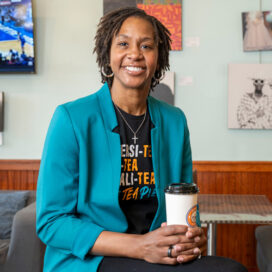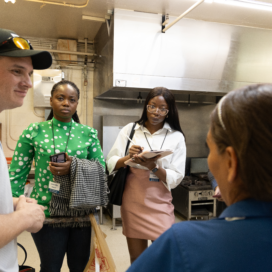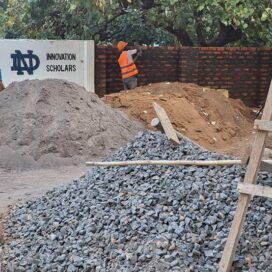Business on the Frontlines: ‘Recognizing the impossible is absolutely necessary’
Published: April 19, 2019 / Author: Carol Elliott
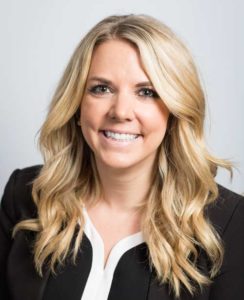 Today, as an IBM client executive, Kelly Chase (MBA ’16) is responsible for managing the overall relationship between the giant information technology corporation and several large multinational clients. She’s had early career success: earning promotions, gaining exposure to senior executives and increasing sales revenue within her territory.
Today, as an IBM client executive, Kelly Chase (MBA ’16) is responsible for managing the overall relationship between the giant information technology corporation and several large multinational clients. She’s had early career success: earning promotions, gaining exposure to senior executives and increasing sales revenue within her territory.
Ask her to reflect on what brought her to her current success, and Chase draws a straight line from her Chicago office to remote villages in Timor-Leste (East Timor), a tiny Southeast Asian nation more than 9,000 miles away. In spring 2016, she traveled there as part of an innovative, and as it turns out, transformative Notre Dame MBA course Business on the Frontlines (BOTFL).
“Business on the Frontlines has been the differentiator as I started my career,” said Chase. “It was an experience that completely changed the way I make decisions, the way I approach problem solving, and my overall perspective.”
Business on the Frontlines, a signature course of the Notre Dame MBA, has a unique goal: to examine how to harness the dynamism of business to rebuild war-torn societies as a means of bringing about peace. BOTFL teams study a business challenge presented by an outside partner, such as an international humanitarian organization or multinational corporation.
In the spring semester, they fan out across the world to conduct fieldwork, meeting with everyone from government leaders to street vendors. The team provides the partner with detailed reports outlining sustainable solutions to the targeted problem.
In its 10-year history, BOTFL teams have participated in more than 40 projects in 20-plus regions and countries. By one estimate, thousands now earn livelihoods as a result of BOTFL projects in the field.
And as Chase’s story shows, the course is just as instrumental in changing the lives of the students themselves.
“BOTFL has this complexity of business and politics but it also has this simplicity of the human spirit,” she said. “When it comes down to it, BOTFL is about recognizing that what is necessary to solve all the world’s challenges is impossible— but at the same time recognizing that the impossible is absolutely necessary.”
Chase and her four BOTFL teammates arrived in Dili, Timor-Leste’s capital city, in March. They had spent weeks prior to the trip extensively studying the country. They specifically analyzed the challenge presented by their partner, World Vision: Identify sustainable solutions to improve the livelihoods of farmers, who account for 80 percent of Timor-Leste’s population.
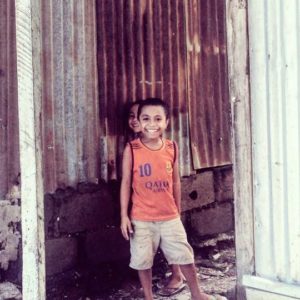 “When I first got to East Timor, it was evident that there were a lot of challenges — and these challenges were heart wrenching,” said Chase. “Children were starving, parents lacked financial literacy, crops were drying up and infrastructure was non-existent. But the real problem? A variety of macroeconomic forces that our team needed to understand in order to put forward a solution that could actually work.”
“When I first got to East Timor, it was evident that there were a lot of challenges — and these challenges were heart wrenching,” said Chase. “Children were starving, parents lacked financial literacy, crops were drying up and infrastructure was non-existent. But the real problem? A variety of macroeconomic forces that our team needed to understand in order to put forward a solution that could actually work.”
The team interviewed farmers in the provinces of Dili, Aileu, Bobonaro and Baucau, as well as governmental authorities, development agencies, local business leaders, academics, and non-governmental organizations. They stayed in the homes of families as they focused on developing scalable solutions that expand existing agricultural market linkages between farmers and retailers to enable transition from subsistence farming to competitive productive farming.
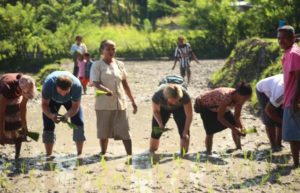 The work wasn’t easy. Temperatures soared over 100 degrees. Mountain roads were mostly mud. Supermarket shelves were bare. They had to learn to interview through an interpreter, as the Timorese speak a combination of Portuguese, Bahasa Indonesia, and the local language Tetum. But it was this hands-on, face-to-face experience where the team had to apply frameworks learned in the classroom to a real-life business case in a high-stakes scenario that today defines BOTFL for Chase and differentiates it from other international programs and service trips.
The work wasn’t easy. Temperatures soared over 100 degrees. Mountain roads were mostly mud. Supermarket shelves were bare. They had to learn to interview through an interpreter, as the Timorese speak a combination of Portuguese, Bahasa Indonesia, and the local language Tetum. But it was this hands-on, face-to-face experience where the team had to apply frameworks learned in the classroom to a real-life business case in a high-stakes scenario that today defines BOTFL for Chase and differentiates it from other international programs and service trips.
“I learned the importance of truly immersing myself in the context of rural farmers in East Timor in order to develop solutions from a place of empathy across multiple layers and dimensions,” said Chase. “We could not take what success looked like in other cultures, economies or time periods and apply it directly to the challenge put before us. I also recognized that my team made the most progress while collaborating and continually testing our ideas with the Timorese.”
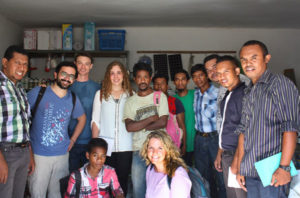 The BOTFL team proposed three different projects to World Vision that potentially bridge the challenges between rural farming communities and potential purchasers in Dili. Their work brought World Vision a greater understanding and awareness of opportunities in partnering with the private sector, particularly in creating stronger supply chains for local agricultural products.
The BOTFL team proposed three different projects to World Vision that potentially bridge the challenges between rural farming communities and potential purchasers in Dili. Their work brought World Vision a greater understanding and awareness of opportunities in partnering with the private sector, particularly in creating stronger supply chains for local agricultural products.
For Chase, participating in BOTFL continues to be a defining experience in her personal and professional lives. In fact, she has stayed involved as an advisor. She traveled with a team to Uganda in 2018 to work on new business models to expand construction capabilities in support of access to education, and she plans to go to Colombia in spring semester 2019.
“That’s the thing about BOTFL— it never really ends,” said Chase. “At the end of the day, you leave your partner with a set of actionable instructions that they are capable of delivering to make a difference. And you also leave with a sparkle in your eye and pie-in-the-sky idea that you know will continue to help future BOTFL students shift the trajectory for years to come.
“This unique blend of experiences and lessons is something that every MBA student should be able to experience. It is something that truly differentiates a Mendoza graduate in the corporate world.”

